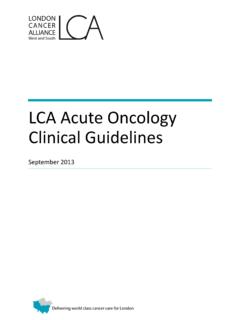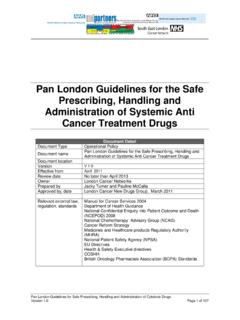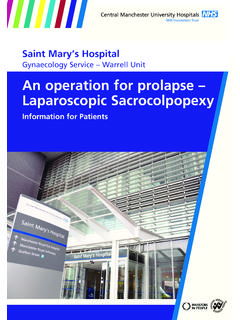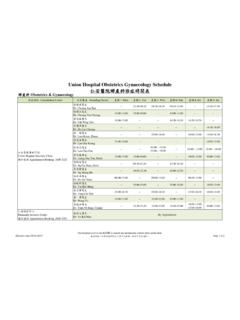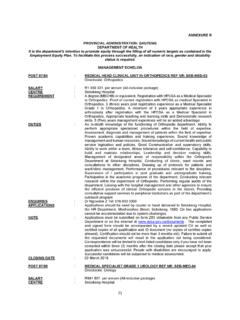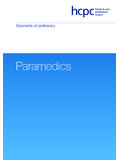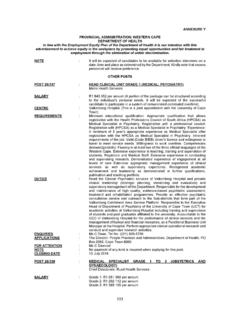Transcription of LCAGynaecological CancerClinical Guidelines!
1 LCA Gynaecological Cancer Clinical Guidelines July 2014 LCA GYNAECOLOGICAL CANCER CLINICAL GUIDELINES Contents Introduction .. 5 Executive summary .. 6 1 The Structure of gynaecology Oncology Services .. 7 Cancer units .. 7 Cancer centres .. 7 2 Referral for Suspected Gynaecological Cancer .. 9 Primary care referrals .. 9 Referrals to the cancer centre .. 10 Children, teenagers and young adults .. 10 3 Data Requirements .. 11 The Cancer Outcomes and Services Dataset (COSD) .. 11 Systemic Anti- Cancer Therapy dataset (SACT) .. 11 Radiotherapy Dataset (RTDS) .. 11 Cancer Waiting Times dataset .. 11 Local data requirements .. 12 4 Ovarian Cancer.
2 13 Background .. 13 Presentation and referral .. 14 Initial diagnostic investigations .. 15 Staging .. 16 Management .. 19 Follow- up .. 26 Carcinosarcomas .. 27 Non- epithelial ovarian tumours .. 27 Germ cell tumours .. 27 Borderline ovarian tumours .. 28 Research .. 29 5 Cancer of the Endometrium .. 31 Background .. 31 Presentation and referral .. 32 Initial diagnostic investigations .. 32 2 CONTENTS Staging investigations .. 33 Management .. 34 Follow- up .. 40 6 Uterine Sarcomas .. 43 Background .. 43 Diagnosis and staging investigations .. 43 Management .. 45 Recurrent and metastatic disease .. 45 7 Cervical Cancer .. 47 Background.
3 47 Presentation and diagnosis .. 48 Staging and other investigations .. 48 Management .. 50 Recurrent and metastatic disease .. 55 Special circumstances .. 55 Follow- up .. 56 8 Carcinoma of Vagina .. 59 Background .. 59 Presentation and diagnosis .. 59 Staging and other investigations .. 60 Management .. 61 Recurrent and metastatic disease .. 62 Follow- up .. 63 9 Cancer of the Vulva .. 64 Background .. 64 Diagnosis and referral .. 64 Management .. 67 Follow- up .. 71 10 Imaging Guidelines .. 73 Ovarian cancer .. 73 Endometrial cancer .. 75 Carcinoma of the cervix .. 76 Carcinoma of the vagina and vulva .. 79 3 LCA GYNAECOLOGICAL CANCER CLINICAL GUIDELINES 11 Radiotherapy.
4 81 External beam radiotherapy .. 81 Palliative radiotherapy .. 83 Brachytherapy .. 83 Stereotactic radiotherapy .. 83 12 Family History of Gynaecological Cancer .. 85 BRCA gene mutation .. 85 Lynch type mutations .. 85 13 Clinical Nurse Specialist/Key Worker .. 86 The key worker .. 86 Holistic needs assessment .. 87 Patient information .. 88 Treatment summary .. 89 14 Survivorship in gynaecological cancer .. 90 Fertility .. 90 Sexual function .. 90 Pelvic floor dysfunction .. 90 Bladder toxicity .. 91 Bowel toxicity .. 91 Treatment- induced menopause .. 91 Lymphoedema .. 95 Appendix 1: Urgent Suspected gynaecology Cancer Referral Forms.
5 97 Appendix 2: LCA Key Worker Policy .. 102 Appendix 3: LCA Survivorship Guidelines .. 104 Appendix 4: Treatment of Children .. 109 Appendix 5: Treatment of Teenagers and Young Adults .. 110 Appendix 6: Community Specialist Palliative Care Referral Form .. 113 Appendix 7: LCA Holistic Needs Assessment Tool .. 116 Acknowledgements .. 117 4 INTRODUCTION Introduction The London Cancer Alliance (LCA) Gynaecological Cancer Clinical Guidelines provide a practical multidisciplinary guide for the diagnosis, treatment and holistic care and support of patients with gynaecological cancer across the LCA. These guidelines have been developed by the LCA gynaecology Oncology Pathway Group to ensure that care throughout the LCA conforms to national and international best practice.
6 They draw on the expertise of a range of clinicians from across the LCA provider organisations, and subsequently reflect the wider gynaecological cancer pathway. They provide evidence- based clinical information and protocols on all aspects of the gynaecological cancer pathway, while allowing sufficient flexibility to reflect good local practice, and should therefore be used by clinicians to inform the treatment and care they provide. The LCA Gynaecological Cancer Clinical Guidelines have been adapted from, and supersede, guidelines produced by the former cancer networks in north west, south east and south west London, and have been updated to reflect changes and developments in practice.
7 They also take into consideration the National Cancer Peer Review Programme Manual for Cancer Services: gynaecology Measures Version January The LCA guidelines are designed to be used by all healthcare professionals in Trusts within the LCA who are involved in the care of the gynaecological cancer patient. They have been developed to take into account the wide range of clinical experience of the user and the different clinical settings in which healthcare professionals work. The guidelines are intended to assist in the initial assessment, investigation and management of patients. Adoption of the LCA guidelines will allow widespread implementation of up- to.
8 Date and evidence- based management of gynaecological cancer patients, and will assist in the provision of a consistently high standard of care across the LCA. All Trusts are expected to be able to provide the standard of care detailed in these guidelines. These guidelines will be reviewed on an annual basis in line with guidance from the National Institute for Health and Care Excellence, the British Gynaecological Cancer Society, and other national and international guidance, as well as significant new research publications, to ensure that they continue to reflect best practice. Dr Alexandra Taylor Chair, LCA gynaecology Oncology Pathway Group Consultant in Clinical Oncology The Royal Marsden NHS Foundation Trust 1.
9 5 LCA GYNAECOLOGICAL CANCER CLINICAL GUIDELINES Executive summary The London Cancer Alliance (LCA) Gynaecological Cancer Clinical Guidelines combine the best features of earlier network protocols, and have been developed in agreement with clinicians across the LCA. The guidance combines evidence- based and best practice recommendations with the aim of ensuring that there are equitable high- quality services across the LCA. The guidelines are multidisciplinary and cover imaging, pathology, surgery, radiotherapy, systemic therapy and survivorship. Chapter 1 provides an overview of the gynaecology oncology services provided in cancer units and specialist centres.
10 The clinical indications and referral pathways for urgent assessment of patients are outlined in Chapter 2. Accurate data collection is essential to monitor outcomes, and the collection of this information, particularly clinical data, remains the responsibility of the members of the multidisciplinary team with support from a data manager. The LCA Pathway Group is currently developing specific quality measures for gynaecological cancer in addition to the core datasets described in Chapter 3. The diagnosis and management of ovarian, uterine, cervical, vaginal and vulval cancers are described in tumour- specific chapters (4 to 9). These chapters cover the options available to patients, including surgical intervention, chemotherapy, radiotherapy and palliative treatment.
